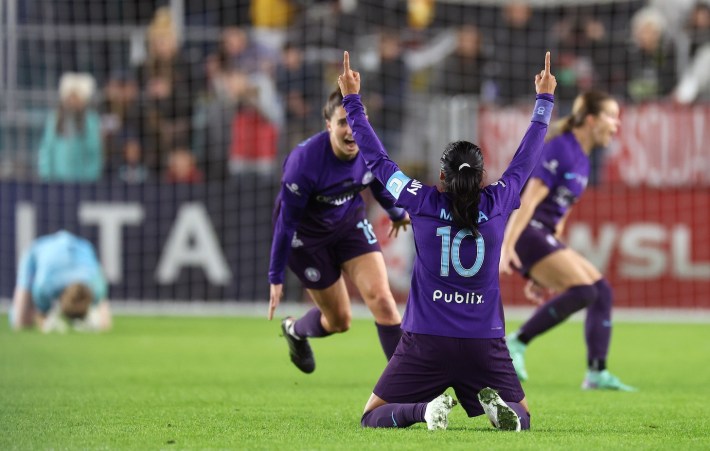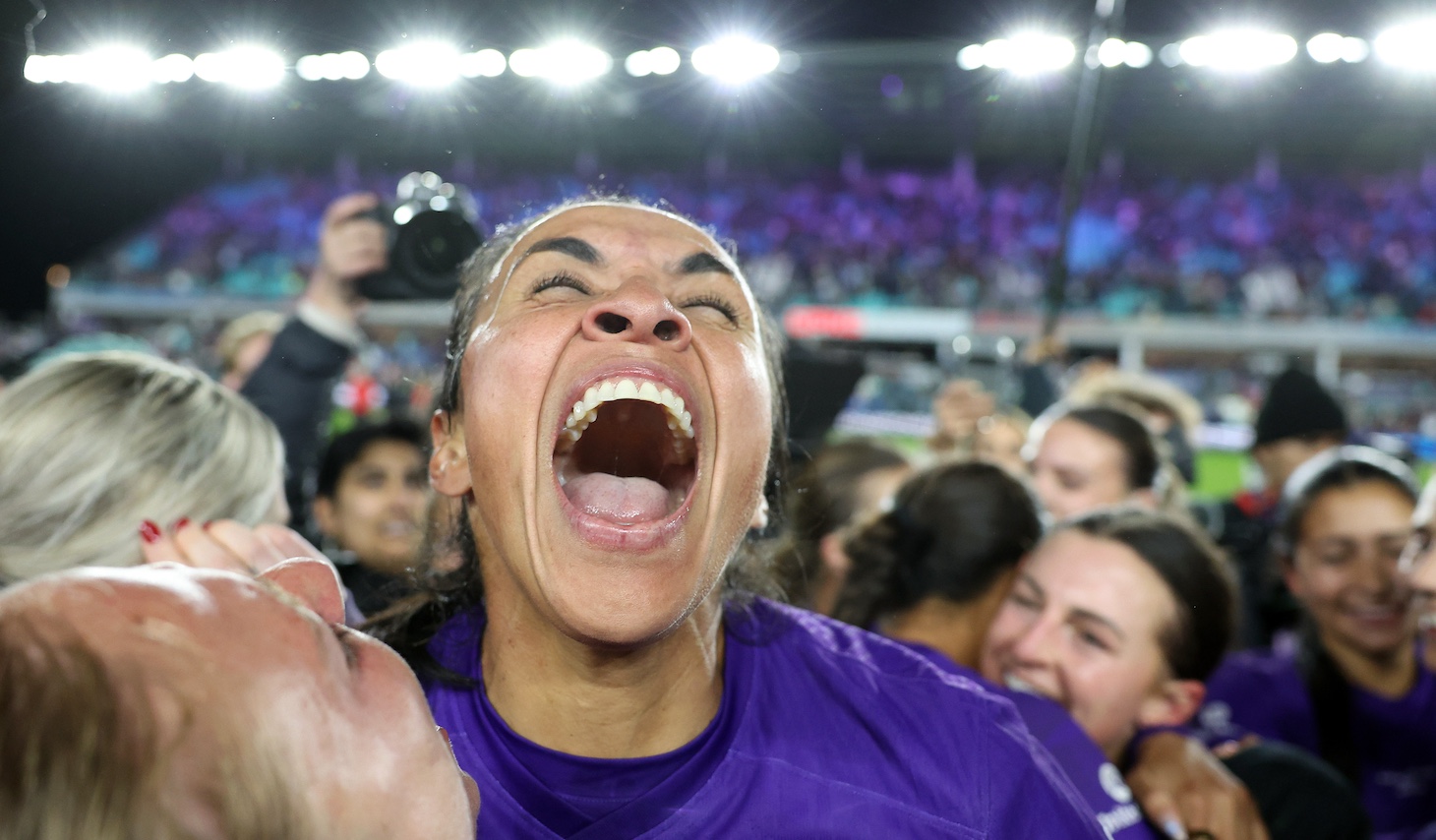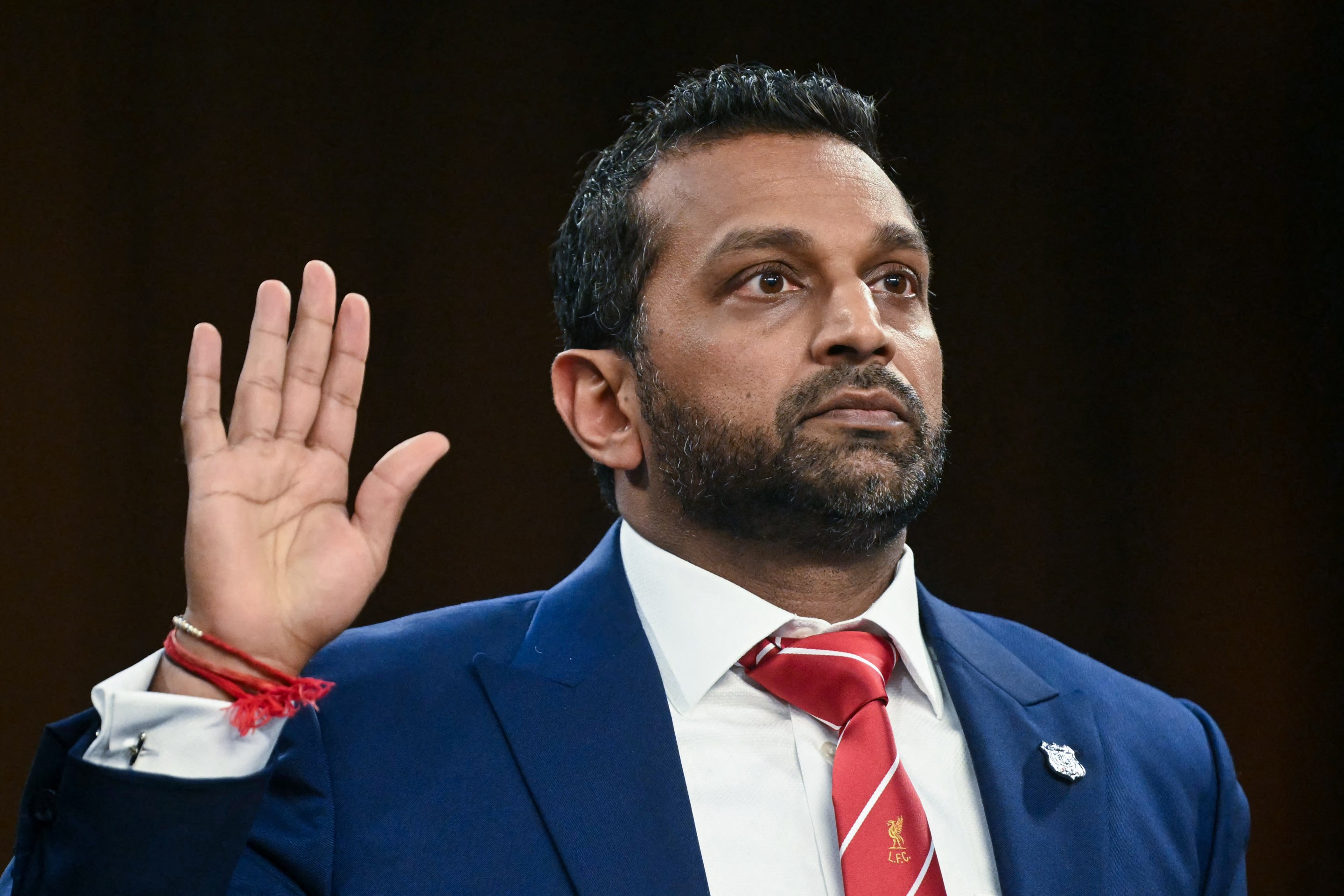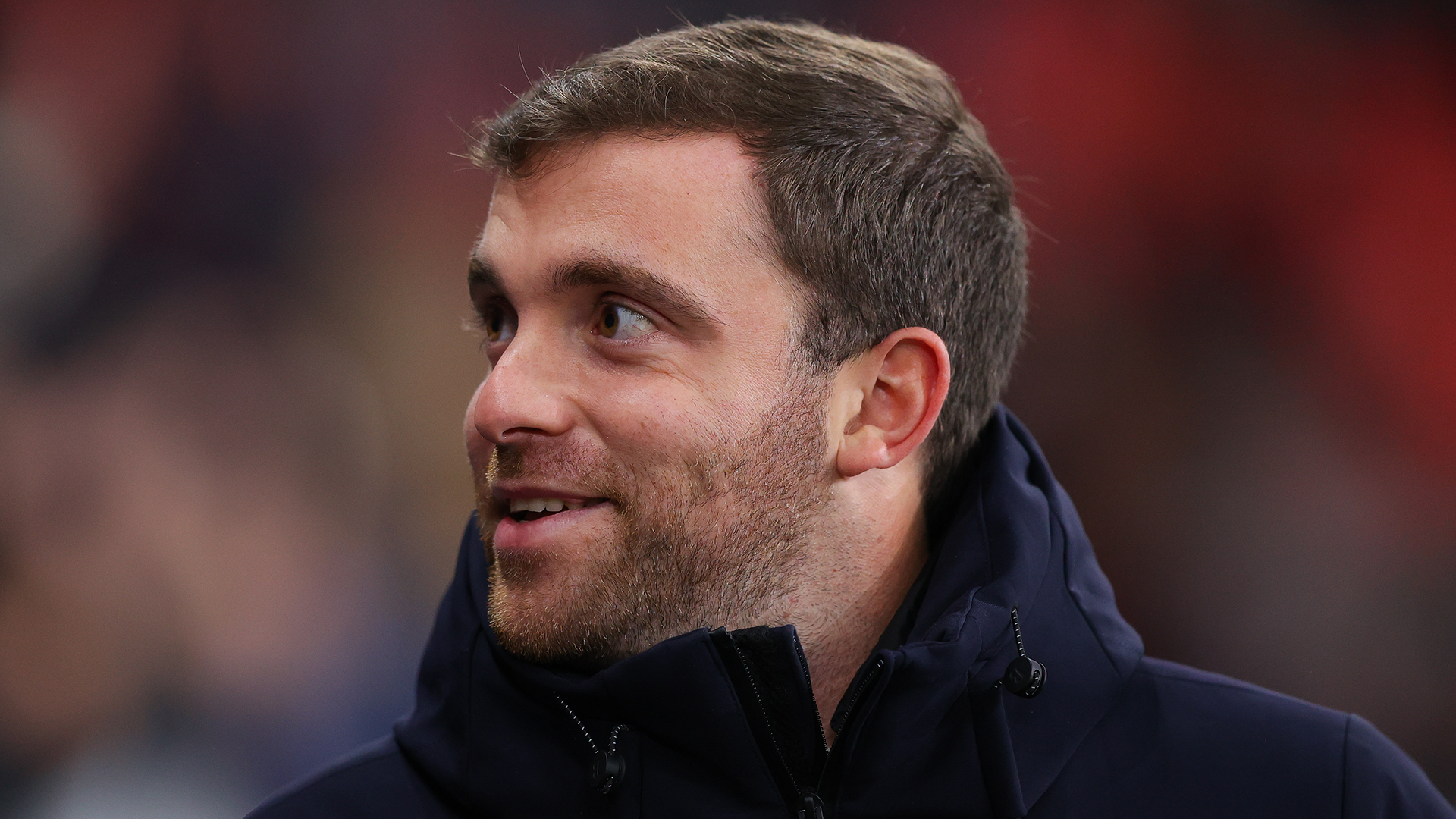Before Saturday’s NWSL championship-deciding match between the Orlando Pride and the Washington Spirit, Brazilian legend Marta reflected on her journey with Orlando, where she’s played since 2017, the club’s second-ever season in existence. As the only remaining player from that squad, she told Sandra Herrera that she’s asked herself, “Why? Why am I still looking to do something special here?”
The journey hasn’t been an easy one. The Pride had only made the playoffs once before this year, back in Marta’s first season in 2017. Despite star-laden squads led by the likes of Alex Morgan, Ali Krieger, Sydney Leroux, Ali Riley, and Marta herself, Orlando never could quite form a team greater than the sum of its most impressive parts. Until this season, that is, when Marta, Orlando, and maybe even the NWSL as a whole all found the success they’d long been working for.
The Pride were a real-deal juggernaut this season, arguably the best team the NWSL has ever seen. Led by coach Seb Hines and general manager Haley Carter, Orlando assembled a roster that was maybe less flashy than some previous ones but made up for it in depth and cohesion. Orlando won the NWSL Shield, awarded to the team with the best regular-season record, with a record-setting 60 points, along the way amassing a record-setting eight-game winning streak and a record-setting 24-match unbeaten streak. In the playoffs, Orlando brushed aside Chicago in the quarterfinals and, sealed with an instantly iconic Marta goal, squashed the offensive powerhouse Kansas City in the semis. The final against the Spirit was to be the toughest challenge yet, pitting the league’s two best and probably also coolest teams against each other, in the kind of blockbuster final that had all NWSL fans salivating.
Alas, Saturday’s championship match at CPKC Stadium in Kansas City wasn’t the free-flowing display of beautiful football that these two teams can do at their best. It was a typical championship match—chippy, nervous, and repetitive. The Spirit dominated in the midfield from the outset, even without Andi Sullivan and rookie of the year Croix Bethune, both lost to injuries. This was in large part because manager Jonatan Giráldez started Makenna Morris over fellow rookie Heather Stainbrook, which proved an excellent decision. Morris created chance after chance, and delivered the quality set pieces the Spirit sorely missed in the semifinal against Gotham.
The Spirit’s attacking trident of Trinity Rodman, Rosemonde Kouassi, and Ashley Hatch looked sharp all night, but Orlando’s defense was the best of the season for good reason. They were able to resist the Spirit’s waves of attack, if anxiously. Winger Ally Watt was tasked with a big job—staving off both Casey Krueger and Kouassi down her flank—and she did it marvelously, all but neutralizing them both while also making attacks deep in the Spirit’s half in the other direction. On the opposite side of the pitch, left back Kerry Abello struggled to contain Rodman, though that’s about the best anyone can hope for against a powerhouse like Rodman.
Where the Spirit made use of all three prongs of their attack, the Pride relied primarily on Barbra Banda. Upon winning the ball in their own half, they often just booted it up into Banda’s general vicinity. Banda being Banda, you could understand the appeal of this kind of route-one attacking, though in reality it mostly played to the Spirit’s favor for being so predictable. Washington dominated possession, and its defense was almost never overwhelmed in the first half. Still, Banda is Banda, and almost perfect is rarely good enough.
Her dominance, and her importance to Orlando, was made clear in the 37th minute. After resisting yet another Washington attack, Angelina made a long, arcing pass ahead of Banda. Washington Spirit supporters will have you know that to get enough space to make said pass, Angelina literally pushed aside Leicy Santos with a two-handed shove. But the referee’s whistle never came, so Banda found herself in a footrace with Esme Morgan. The Zambian beat Morgan to the touchline and left her for dead with a heel-chop infield, increasing her angle on goal from nothing to almost nothing. She then scorched a shot past goalkeeper Aubrey Kingsbury’s foot and into the back of the net. An inevitable goal from an inevitable player.
BARBRA BANDA STRIKES FOR @ORLPRIDE IN THE @NWSL CHAMPIONSHIP🤩💥 pic.twitter.com/6iCirkLITS
— Attacking Third (@AttackingThird) November 24, 2024
The rest of the first half felt supercharged. Marta had but missed a couple fantastic chances, and on the other side, a header from Hatch went off the woodwork. Washington carried this supercharged, uh, spirit into the second half. Although the Pride did make a few threatening attacks, the first 15 minutes of the second half were the Spirit’s. They pummeled Moorhouse with shots, and the Pride’s outlet—Banda—was too tired to be as effective as before. Morris continued creating chances off of excellent set pieces, and Moorhouse consistently met the challenge, if only just.
Around the 60th minute, the Pride got new life. The defense found its footing, and Marta stepped up to generate some great offensive plays. For the rest of the match, neither team had a clear edge. Kouassi, though, was the star of the second half; after Watt was subbed off, she posed the most dangerous, persistent threat to Orlando. But Kouassi and her team were tired and frantic, which made the final 10 minutes plus stoppage time a bewildering chaos. For all the fouls the ref called, the game got even more physical. Players from both teams were taking panicked shots. My heart felt like it was going to beat out of my chest. Washington was knocking, banging, throwing themselves against Orlando’s door until the very final whistle, but Orlando kept it closed.

At the whistle, Marta fell to her knees, praising God. The entire Pride team crowded around her, praising the greatest player this game has ever seen. The postgame celebrations were, fittingly, Marta-centric. Marta's mom had made the trip up from Brazil to watch her daughter play—the first time she’s seen her at work in the U.S. Before Marta lifted the trophy, the first-time NWSL champion shouted out her mom and her teammates with whom she climbed to the mountaintop. “I fucking waited eight years for this moment,” she screamed.
Marta drops some hints on the future of her career 👀 pic.twitter.com/DSkRRmvdch
— Attacking Third (@AttackingThird) November 24, 2024
After the match, Marta extolled the NWSL’s virtues. “The best players in the world are here,” she said. “I’ve been playing in Europe for many years, of course they have good teams there. But the game is not the same every single week. You don’t play against a strong team every single week.” Marta’s comments about the league’s parity ring especially true in light of Orlando’s Cinderella transformation—from missing the playoffs last year to resounding champions on Saturday. Last year’s championship had a similar arc; Gotham won after having finished dead last in the league in 2022.
But looking beyond the two champions, this season’s story was different from last year’s. In 2023, 13 points separated the first-place team from the last-place one. This year, it was 40—more than San Diego, last year’s shield winners, had at all. Even among the teams that made the playoffs, there was a chasm. The top four teams ended within five points of each other, but there was a steep dropoff of 16 points from fourth-place Kansas City to fifth-place North Carolina. The top four teams were in a league of their own.
It wasn’t surprising that those four terms—Orlando, Washington, New Jersey/New York, and Kansas City—all won their quarterfinal matchups. They have all benefited immensely from smart front-office moves, and they show that there are several different ways to build a contender. The Pride collected a bunch of experienced, underrated players and made them better. The Spirit leaned on rookies, six of whom scored this season. Gotham recruited a ton of big-name players. Three of the four saw massive returns on the league’s expanded scouting scope, adding players of African origin (led by Banda, Kouassi, and Temwa Chawinga) who immediately emerged as superstars. And Kansas City built a whole damn stadium!
The flip side of the true excellence at the top of the table was a true race to the bottom among the worst teams. Many of the clubs below the playoff line suffered the consequences of managerial incompetence, dangerous choices, or both.
Houston, which finished last, handled the perplexing, months-long absence of manager Fran Alonso with the grace of an ogre, and clarified the matter only after Diana Ordóñez publicly expressed her frustration with the situation. This was no surprise to anyone paying attention—if things were looking bright for the Dash when they signed María Sánchez to a record deal in December, it was clear that there were serious problems when she requested an immediate trade in April.
The team Sánchez landed at, the San Diego Wave, had been off to a so-so start when she joined, but made a series of boneheaded decisions in the summer which tanked their results. I would be shocked if the firing of acclaimed manager Casey Stoney and the hiring of Landon “I'm not for equal pay” Donovan as her interim replacement had nothing to do with the prompt departures of Abby Dahlkemper and Alex Morgan. Now, the club and league are being sued by former employees for creating an abusive work environment.
In the global conversation about the strong and weak points of women’s leagues around the world, parity has become central to the NWSL’s claim to excellence. But now, mechanisms that used to keep NWSL teams even are disappearing. The landmark 2024 CBA, which was proactively negotiated well before the last one ended, sees to the elimination of the college and expansion drafts. It grants players automatic free agency after contracts end, and it bans trades without player consent. By 2024, the minimum player salary will be $82,500. The league and the players association seem to understand that players suffer when there are mechanisms in place to control their movement, even if those mechanisms are meant to create a more competitive league.
The salary cap model itself—the most powerful remaining equalizing mechanism—might look different in the next CBA. Lynn Williams and Sydney Leroux both criticized it in the wake of the league fining and docking points from Angel City for violating the cap. On The Women’s Game, Williams said that although she still believes a salary cap should exist, it should be a lot higher. As it is, it “handcuffs teams” who can afford to pay their players better. “Why not force the bottom teams to come up?” she asks. “And if they can’t come up, then you sell or you unfortunately can’t be a team anymore.” Leroux, an Angel City player, criticized the league for including parental benefits under the salary cap—a choice she said disincentivizes teams from hiring players who are mothers.
Even the salary cap isn’t all-powerful, however. Midge Purce, last year’s NWSL Championship MVP, detailed her struggle of deciding where to play this season in her new reality show The Offseason. She received several lucrative offers from around the league, which made her feel valued as a player. But what she wanted was to stay with Gotham, which had drained its pockets building a star-studded team. Despite her disappointment with her salary at Gotham, she opted to stay, showing that great players may forgo larger paychecks to be with other great players. In the end, salaries aren’t the end-all-be-all of deciding where to play. Team culture, as well as material resources like dedicated training grounds and stadiums, are now important factors for players in deciding where they’ll play. These elements, which require actual care from front offices to create and maintain, will be what separate the best teams from the rest.
The NWSL is no longer in the days of just getting by, of excusing poor performances and work environments because at least we have a league. Indeed, six players from the league’s inaugural season played their last games this year: Alex Morgan, Christine Sinclair, Merritt Mathias, Kelley O’Hara, Desiree Scott, and Sinead Farrelly. Players like them, and like Marta, have made the NWSL what it is today—their talent, drive, and principles dragging forward a league that was not always worthy of them. Thankfully, at least some of the institutions appear to be catching up. From the greatness of the top teams the season, the influx of talent from all over the world, the reestablishing of the league as the standard bearer for women’s soccer globally, and the announced changes to the CBA rules, the NWSL has entered a new era. The players, of course, continue to lead the way, and their message is clear: We’re going forward, and you teams lagging behind better get your shit together. No one is coming to save you, unless you make a place worth saving.






